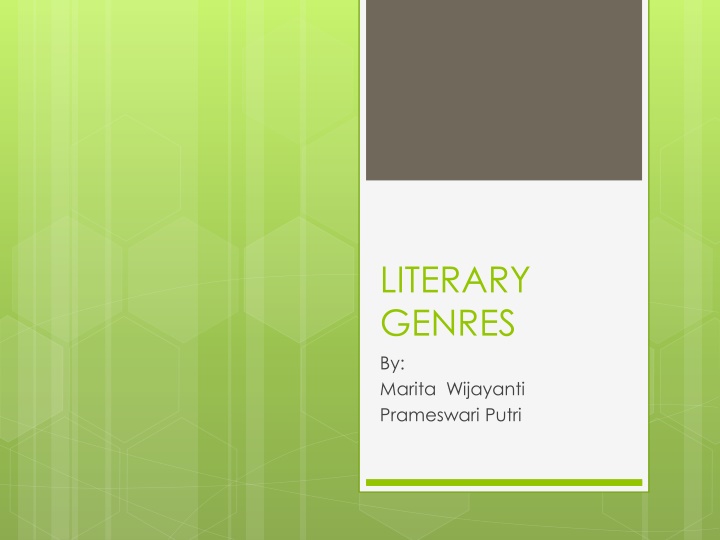
Literary Genres: Classification and Characteristics
Explore the concept of literary genres through classification and defining characteristics such as plot, character, presentation, and narrative perspective. Discover how genres like fiction, drama, and poetry are categorized based on their structural features.
Download Presentation

Please find below an Image/Link to download the presentation.
The content on the website is provided AS IS for your information and personal use only. It may not be sold, licensed, or shared on other websites without obtaining consent from the author. If you encounter any issues during the download, it is possible that the publisher has removed the file from their server.
You are allowed to download the files provided on this website for personal or commercial use, subject to the condition that they are used lawfully. All files are the property of their respective owners.
The content on the website is provided AS IS for your information and personal use only. It may not be sold, licensed, or shared on other websites without obtaining consent from the author.
E N D
Presentation Transcript
LITERARY GENRES By: Marita Wijayanti Prameswari Putri
WHAT IS GENRE? KEYWORDS: 1. Naming: Names what writers have created, specifies formal features, compare[s] unique authors[,] and works of art. (Devitt, 2004:4)
2. Classifying: A. Genre classifies literature and literary history not by time or place but by specifically literary types of organization or structure. (Wellek;Warren 1949:235) B. A classification system deriving from literary and rhetorical criticism that names types of texts according to their forms. (Devitt, 2004: )
3. Grouping How texts are grouped depends on which features the classifier has selected to observe (Devitt, 2004: ) e.g: An Article of New York Times Review Essay Magazine Article Journalism
4. Shifting the Category: A. This categorization is slightly confusing as the epic occurs in verse, too, but is not classified as poetry. It is, in fact, a precursor of the modern novel (i.e., prose fiction) because of its structural features such as plot, character presentation, and narrative perspective. (Klarer, 2004:3) e.g: John Milton s Paradise Lost: At the beginning, it s known as an epic, but consists of verse. It s been a question whether it s called an epic or a poetry.
Klarers Conclusion: *What is called Genre is something Canonical Fiction Drama Poetry
B. Welleks Categorization : Genre Imaginative Literature Fiction Drama Poetry Novel Short Story Epic Prose Verse
So that . . . . Genre is a classification system of naming and specifying literary works based on its characteristics and structural features; plot, character, presentation, and narrative perspective.
Dengan merujuk pada klasifikasi yang dikemukakan Rene Wellek dan Austin Warren, maka berikut adalah yang termasuk dalam Literary Genres: Fiction (Novel, Short Story, and Epic) Drama (Prose and Verse) Poetry
FICTIONS Unsur Unsur Fiksi 1. Plot 2. Karakter 3. Sudut Pandang 4. Setting Jenis Jenis Fiksi 1. Novel 2. Cerita Pendek
POETRY Jenis-Jenis Puisi 1. Puisi Narasi 2. Puisi Lirik Unsur-Unsur Puisi 1. Ballads 2. Symbols
Gaya Bahasa Puisi 1. Simile 2. Metafora 3. Imaginism Jenis Rima 1. Lexical-thematic dimension 2. Visual dimension 3. Rhythmic-acoustic dimension
DRAMA: The form of composition designed for performance in the theater, in which actors take the roles of the characters, perform the indicated actions, and utter the written dialogue (Abrams, Harpham, 2005:84)
JENIS DRAMA Prose Drama Verse Drama Tragedy Comedy
DAFTAR PUSTAKA Abrams, M.H. Harpham, Geoffrey. (2005) Glossary of Literary Terms. Boston: Wadsworth Cengage Learning. Devitt, Amy J. (2004) Writing Genres. Illinois: Southern Illinois University Press. Klarer, Mario. (2004) An Introduction to Literary Studies. USA: Routledge Wellek, Rene. Warren, Austin. (1949) A Theory of Literature. USA: Harcourt, Brace and Company. Inc
